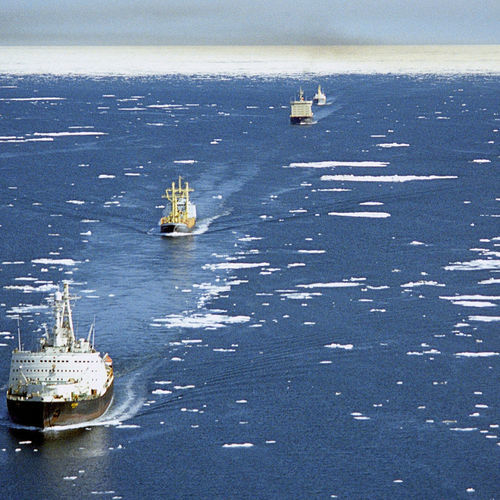ÐÎÑÑÈÉÑÊÈÉ ÏÐÎÔÅÑÑÈÎÍÀËÜÍÛÉ ÑÎÞÇ ÌÎÐßÊÎÂ
SEAFARERS' UNION OF RUSSIA
A NON-UNIONIZED SEAFARER
IS AN UNPROTECTED SEAFARER
Back
New bans are being prepared for foreign-built vessels

The Ministry of Industry and Trade of the Russian Federation has prepared a draft resolution with a list of activities that can be carried out exclusively by Russian-built vessels. If adopted, the ban for vessels built abroad will include sea transportation of oil, gas (including liquefied), gas condensate and coal extracted in Russia and loaded on ships in the waters of the Northern Sea Route (NSR), to the first point of unloading or reloading. The main goal of the innovations is to develop import substitution in shipbuilding and to provide orders to Russian shipyards.
Also, the list of activities that can only be carried out by Russian-built vessels includes coasting, hydrotechnical, underwater-technical and other similar work in internal sea waters or the territorial sea, sanitary, quarantine and other types of control, icebreaking and pilotage. The storage of coal and hydrocarbons on a ship in the waters of the Northern Sea Route will also fall under the restriction.
According to the amendments to the Merchant shipping code of the Russian Federation, the requirements for the use of Russian-built vessels (that is, corresponding to the parameters of the 719th localization resolution) do not apply to already commissioned or ordered vessels. In addition, the government may allow the use of foreign ships if there are no conditions or the possibility of carrying out technological operations for their construction in the Russian Federation, or if their construction is «impossible to ensur». It is noted that the Ministry of Transport supports the project.
Currently, consultations are underway with the Ministry of Industry and Trade, manufacturers of ship equipment, representatives of shipyards and shipowners to determine the balance between the needs of shipowners and the capabilities of manufacturers of ship equipment and shipbuilding enterprises, for a gradual and smooth transition to greater localization of ship construction in the Russian Federation.
Valeriy Nefedov, chief legal expert of the Seafarers Union of Russia, believes that in general, this project is a good idea as thanks to it the exclusive right to transport hydrocarbons by sea along the NSR will be granted not just to ships under the Russian flag, but to those built on the territory of the Russian Federation.
«Nevertheless, in my opinion, this solves not so much the problem of protecting the national maritime labor market, as providing orders for Russian shipbuilding. That is, it guarantees employment to employees of the shipbuilding industry of the Russian Federation. For seafarers, it does not play a similar role. Since the legislation regulating the procedure for attracting foreign citizens to the Russian labor market, including for their work as part of the crews of Russian sea vessels, has quite a lot of exceptions, freeing shipowners from the need to obtain permits to attract foreigners for their work in the Russian Federation,» - he stressed.
«This is a really urgent problem that threatens the employment of our seafarers. So, although Russian legislation provides for a special procedure for issuing permits to attract foreign seafarers to work on ships under the flag of the Russian Federation in some laws already adopted and being developed, this requirement is ignored. It comes to the requirement that the permission must be issued by the central office of the Ministry of Internal Affairs, and not by its territorial bodies, and only after receiving an opinion from Federal agency for Maritime and River transport of the Russian Federation (Rossmorrechflot) that hiring a foreigner will not harm the employment of Russian seafarers, and when issuing the organization takes into account the opinion of the trade union».
In addition, in 2016, the previous procedure for issuing certificates of Federal agency for Maritime and River transport of the Russian Federation (Rossmorrechflot) allowing foreigners to work was canceled, and the new one was never adopted. This threatens the very functioning of the permit system, in which, without this conclusion, it is simply impossible to obtain a work permit for a foreign seafarer on board. This can become a loophole for employers who will take advantage of a legislative flaw to hire foreigners in circumvention of the law.
The union has repeatedly spoken out about these problems. In particular, in November last year, on behalf of the Federation of Maritime Transport Workers Trade Unions (FPRMT), Chairman Yuriy Sukhorukov, in his speech at the working group of the Russian Trilateral Commission (RTC) on labor market development and employment promotion, stressed the need to deal with these issues and cancel the cases of shipowners' exemption from the need to obtain permits to attract foreigners to work on Russian ships. His position was supported by the members of the RTC, and an extract from the minutes of the meeting was sent to the Ministry of Transport of the Russian Federation with a proposal to organize and hold an interdepartmental meeting with the involvement of the Ministry of Labor, the Ministry of Eastern Development, as well as the Russian Chamber of Shipping, at which to consider the Federation's proposal to adjust the current legislation that exempts Russian shipowners from obtaining permits.
The Ministry of Transport has not yet implemented this decision of the RTC.
It should be noted that at present, Russian shipowners, even if they hire only Russian seafarers, are able to provide work for only about 50% of specialists. In such conditions, additional competition with foreigners is unacceptable.
Up
